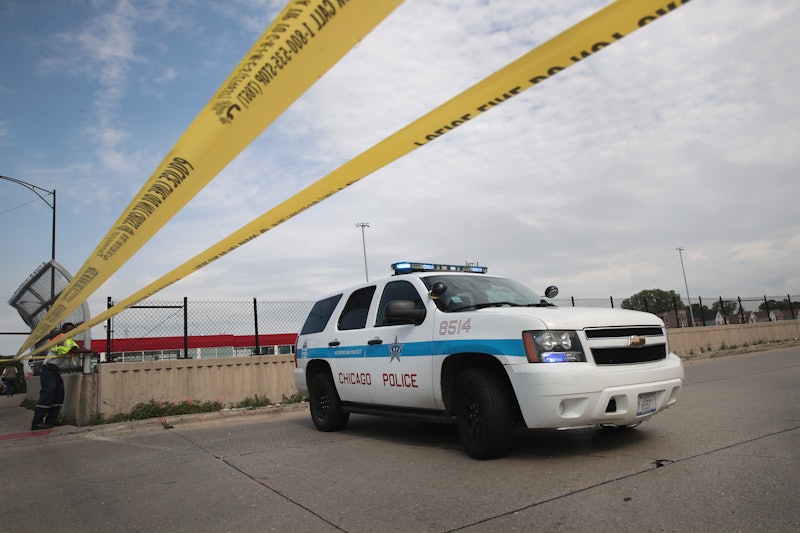News
Video Of A "Bait Truck" In Chicago Filled With Expensive Shoes Has Enraged The Community

The Chicago Police Department came under fire this month after the recent placement of a "bait truck" in a poor neighborhood resulted in multiple arrests. In a joint surveillance operation with a transportation company called Norfolk Southern Railway, Chicago police placed a "bait truck" of Nike shoes in the southwest neighborhood of Englewood, prompting backlash from activists who accused the department of entrapping young people in a low-income, predominantly black community.
Vox reported on Thursday that a truck full of Nike Air Force 1 sneakers and Christian Louboutin shoes had turned up in Englewood last week, and traveled to more than one site in the neighborhood. The purpose of the truck, according to Vox, was for Chicago police and Norfolk Southern to lure thieves to their arrest following alleged cargo thefts in the area. In a statement emailed to Bustle on Saturday, the Chicago Police Department indicated that three men had been arrested and charged with burglary in connection to the bait truck; one was also charged with assault.
"The operation was conducted by the Norfolk Southern Railroad Police," the statement said. "CPD assisted with enforcement as necessary."
After facing significant backlash from both Chicago residents and the American Civil Liberties Union, Norfolk Southern issued an apology for its surveillance operation — dubbed "Operation Trailer Trap," according to the Chicago Sun-Times. In a statement also emailed to Bustle on Saturday, Norfolk Southern spokesperson Susan Terpay said the company regrets that "this operation eroded trust between law enforcement and the community," and that it does not plan on using similar bait devices in the future.
"We welcome a dialogue with the community," Terpay wrote, "and we already have reached out to local officials to discuss how best to prevent freight theft, improve community relations, and rebuild mutual trust."
However, Terpay also said that the operation took place "in direct response to ongoing cargo theft from parked and locked containers and trailers in that area," and said that the costs incurred from freight thefts "are passed on directly to consumers."
"It must be noted that these break-ins included thefts of guns and ammunition that found their way into the local community," the statement read. "At the time, local residents and officials told us we needed to do more to prevent this, and we have responded."
According to the Chicago Sun-Times, the CPD did not help plan the surveillance operation, but instead assisted Norfolk Southern's private police force in arresting three people who allegedly removed merchandise from the truck. Terpay alleged in her statement — which contained three video surveillance clips of the truck — that "within a minute after the trailer was opened, 5-6 other people entered the trailer and began removing boxes," even though only three people were apprehended. The Sun-Times reported, however, that one of the men arrested was deaf, and told police using sign language that he had been looking for food when he entered the truck.
Video footage of the bait truck — shot by community activist Charles Mckenzie and self-described "crime chaser" Martin G. Johnson — went viral after the truck appeared in Englewood, prompting widespread outrage. Their videos of the truck appeared to show Englewood residents confronting police about its presence in the neighborhood.
Although Norfolk Southern apologized for the use of the bait truck, critics slammed both the company and the CPD for creating an even greater atmosphere of mistrust, especially in communities of color. According to the BBC, some critics found the use of a bait truck to be a waste of police resources — especially given that the city recently had one of its deadliest weekends in a long time. Others, like the ACLU's Karen Sheley, told the BBC that Chicago police needed to "focus on building trust and better relationships within the communities they serve, not engage in stunts like bait trucks."